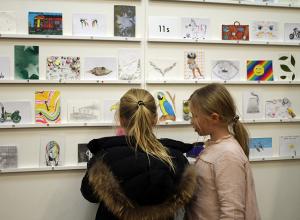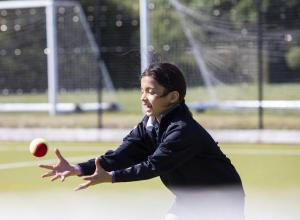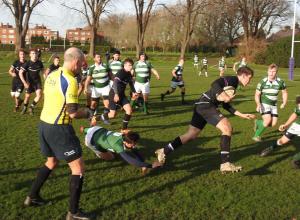
Our society has tended to treat neurodiversity like a failing. So what can we do to change the narrative? asks Andy Woodward
How was Neurodiversity Celebration Week for you? If that sounds flippant, I would ask your forbearance… As I write, the internet tells me I should right now be marking Jazz Appreciation Month, Statistics Awareness Month, IBS Awareness Month and National Stop Snoring Week (my wife wishes I observed that one), among many other official periods of awareness. This is a concept that has perhaps run out of control. But, for all that, Neurodiversity Celebration Week (March 21-27) was… different. For starters, it did something I never imagined any of these marketing exercises might achieve; it really did raise my awareness of its cause! It also grew my knowledge, altered my attitude and bolstered my intentions. Believe it or not, it even got me emotional. Let me explain…
We have so many neurodiverse pupils at Harrodian. So many who have to find different and interesting ways to process information... So many whose families have had to navigate the hurdles of identifying the different ways they learn to gain the tools and recognition they need to thrive.
The concept is this. All brains are different. There is a diversity of brains among us humans, just as there is a diversity of eyes, hair follicles, skin colours, musical preferences and, well, everything really. Between 10-20% of the population are thought to be dyslexic – a condition impacting processing of words. Meanwhile, around 5% of us exhibit traits of dyspraxia (impacting spatial awareness) or of dyscalculia (struggling with numbers and Maths). And around a million people in the UK have an autistic spectrum disorder (ASD) – a term encompassing a range of people who experience issues with social interaction, some of whom who are high-functioning (what was previously called ‘Asperger’s syndrome’), and some of whom need significant specialist support. Some of these conditions overlap, so someone may be dyslexic and dyspraxic. And they are not absolutes – many will exhibit aspects of these and other neurodiverse conditions, such as ADD/ADHD (which really deserves its own blog post, such is its impact in schools), but without ever being diagnosed or requiring support.
So far, so factual. But why did that week in March make a difference? Well, firstly, it was the way it was received. Following the lead of our excellent Learning Support department, I led a few sessions with form groups and spoke about it in year assemblies. And, on each occasion, pupils were engaged and interested – far more, I confess, than I expected. To take it further, I think many pupils felt seen. We have so many neurodiverse pupils at Harrodian. So many who have to find different and interesting ways to process information and get through the work. So many whose families have had to navigate the hurdles of identifying and proving the different ways they learn in order to gain the tools and recognition they need to thrive. This often feels, I fear, like a secret mission, acknowledged only through the convoluted currency of exam concessions. It was really heartening to see the enthusiasm of pupils comparing notes over ‘which one they had’ and realising they could talk about shared experiences.
If your own instinct is still that the notion of ‘celebrating’ neurodiversity seems politically correct, it’s worth considering just how deep and corrosive these negative presumptions have been; how badly we need to change this narrative
But, far more sobering, it was clear this has often been a cause, for many, of embarrassment – or even shame. One of the worst things about how our society has tended to treat neurodiversity is that we’ve allowed it to feel like a failing of some kind – like a negative measure of intelligence. Many was the parent, certainly in the past, who resisted a diagnosis because of its implications – the idea that a label will follow a child, dooming them to lower sets or lesser universities. Indeed, if your own instinct is still that the notion of ‘celebrating’ neurodiversity seems token or politically correct, it’s worth considering just how deep and corrosive these negative presumptions have been; how badly we need to change this particular narrative.
Because neurodiversity does not denote lower intelligence in any meaningful sense. With 5 minutes’ thought, we know that to be true! The world is full of quick-witted, socially adept individuals, exhibiting great social and real-world intelligence, who always struggled in an exam hall – those at school who perhaps ruled the playground but never the classroom. Moreover, there are great advantages to many of the conditions named. The arts, the ranks of entrepreneurs, architects’ firms - each has proved a happy home to dyslexic men and women who seem often to excel in such areas, blessed with ‘big picture thinking’ and ideas that would never occur to book-bound old me… Likewise, many a workplace benefits from the grasp of detail exhibited by those with high-functioning ASD, or the energy and creativity of those with ADHD – once no longer forced to operate in the artificially constrained world of the classroom. There are all kinds of intelligence, and there are all kinds of ways to succeed.
The world is full of quick-witted, socially adept individuals, exhibiting great social and real-world intelligence, who always struggled in an exam hall – those at school who perhaps ruled the playground but never the classroom.
So – am I about to commit us to a whole new approach? Well, this is where I feel the frustration – for many kids I care about, and for various people I care about among my family and friends. We are bound, like every secondary school, to prepare pupils for a set of mandated national exams largely unchanged since the Victorian era – and representing the understanding of intelligence common to that time. The vast majority of what informs the grades given to your children at 16 and 18 is based upon the ability to learn huge amounts of information and reproduce it, silently, in written form, under strict timed conditions. This – reading and writing fast – is a very particular way of demonstrating ability. For some, it’s the preferred way of working, suiting their brain. For many others – capable, knowledgeable and successful others – it is not at all how they best operate. Ten minutes’ conversation with them about the topic at hand would soon dispel the notion that there is any inherent shortfall in intellect or understanding to blame, rather the fact they instead have to convey what they know via the medium of pen and paper. We are, in short, trying, year after year, to force square (or triangular, or even hexagonal) pegs into round holes. And telling the pegs they’re to blame.
We are trying, year after year, to force square (or triangular, or even hexagonal) pegs into round holes. And telling the pegs they’re to blame.
I have been lucky in the fact that this – writing fast under pressure – happens to be something I’m reasonably adept at. However, this is not in any real sense because I’m cleverer than, for example, my extremely capable younger brother. A comparison of our A-Levels might suggest such a pecking order. But, believe me, if ever you found yourself stranded on a desert island, it’s absolutely him you want alongside you. He’d build you a shelter, plumb and wire it, and quite possibly generate the electricity to run it. And he’d do it all with admirable common sense and a level temperament. Yours truly? I’d be telling you what a good blogpost the situation would eventually make, while trying unsuccessfully to balance one stick on top of another and wondering how the heck you catch fish…
Let’s never let our children or pupils believe the lie that they are somehow less able, valuable or impressive than anyone else just because their brains find one thing tricky
The world needs all kinds of people, all kinds of perspectives, and all kinds of clever. It’s something for us to remember as we deal with the short-term business of trying to get them all to jump through the same narrow hoops – hoops that, thanks to hard work, a positive outlook and, in many cases, the help of those aforementioned Learning Support heroes, the majority of our neurodiverse kids DO successfully jump through. But let’s never let our children or pupils believe the lie that they are somehow less able, valuable or impressive than anyone else just because their brains find one thing tricky, or tend towards different strengths. Because, as I was so helpfully reminded last month, neurodiversity genuinely is something worth celebrating.

Mr Woodward is Deputy Head of Harrodian Senior School. He welcomes feedback on his blog to: website@harrodian.com







